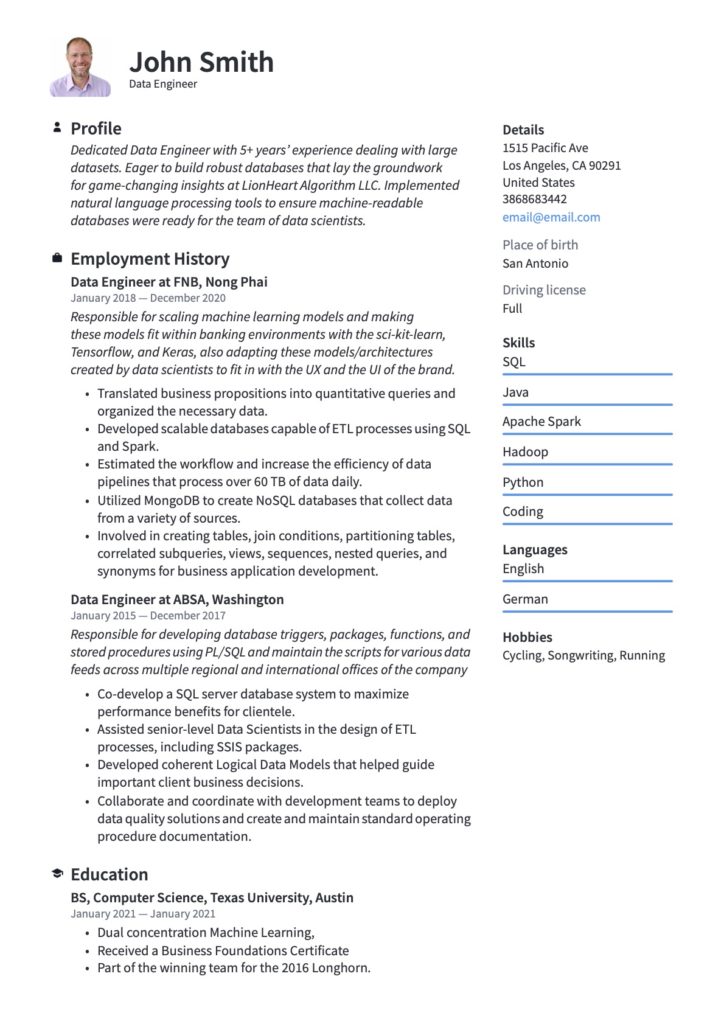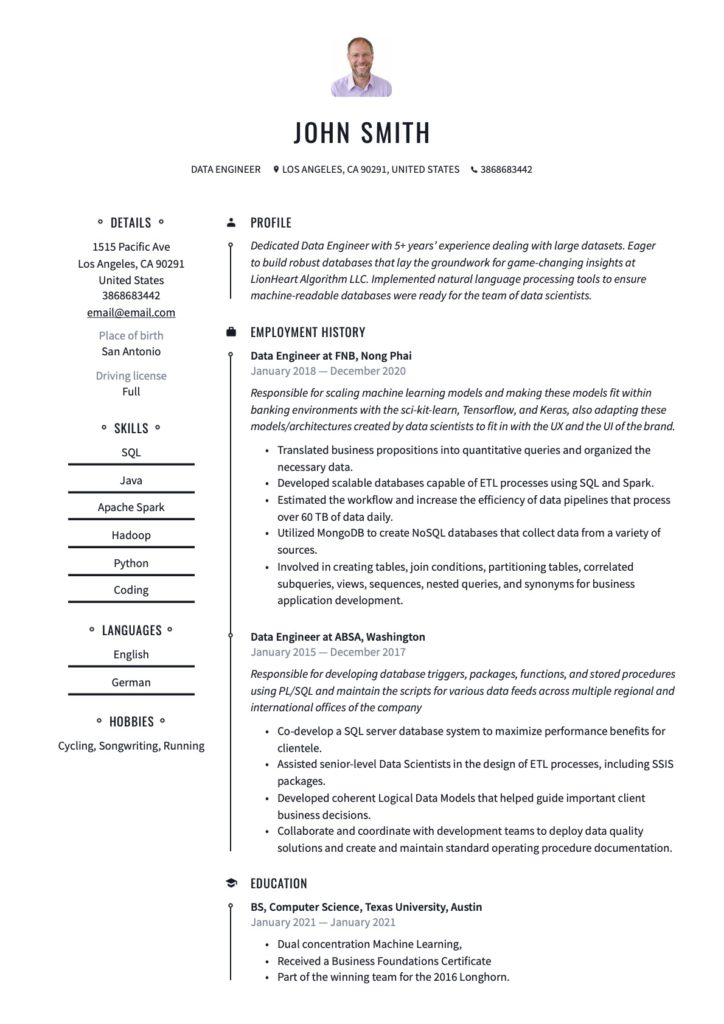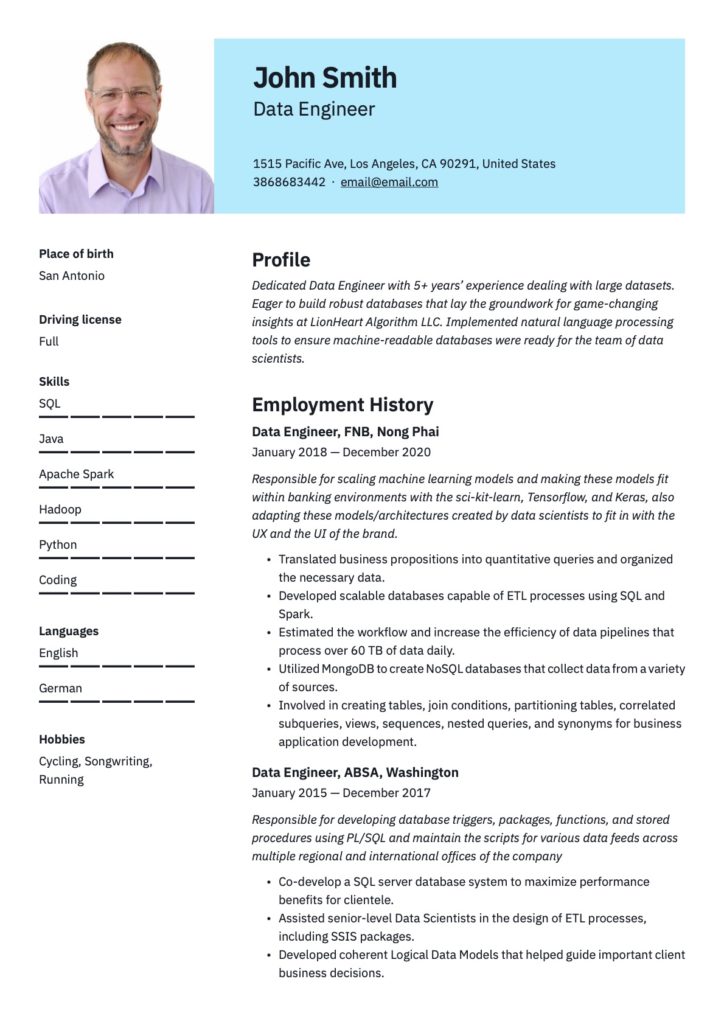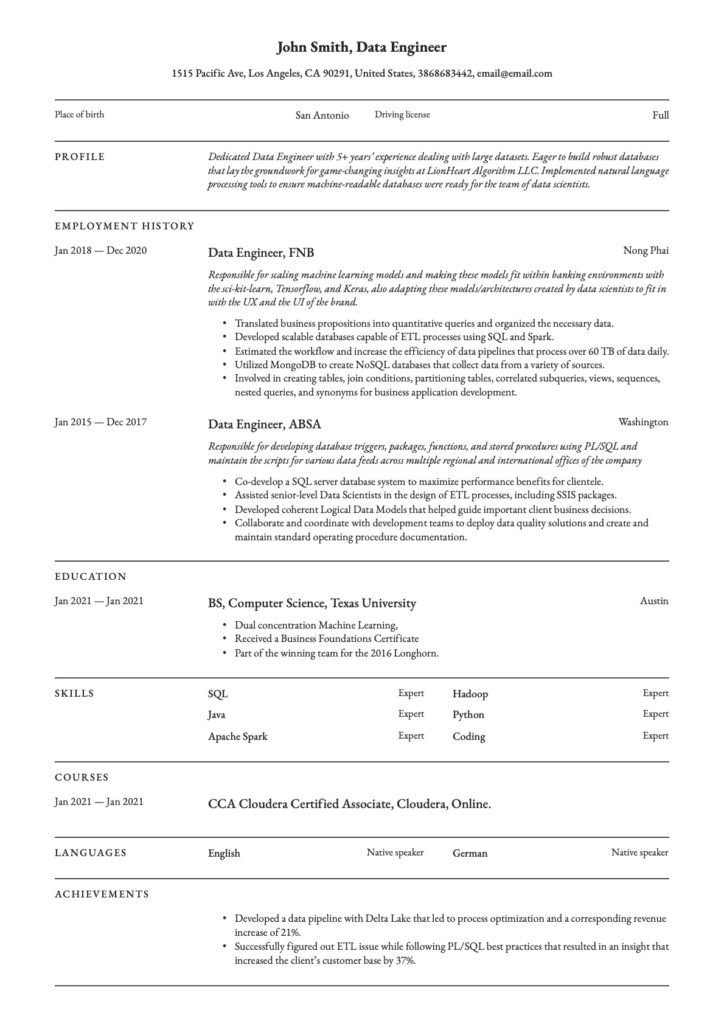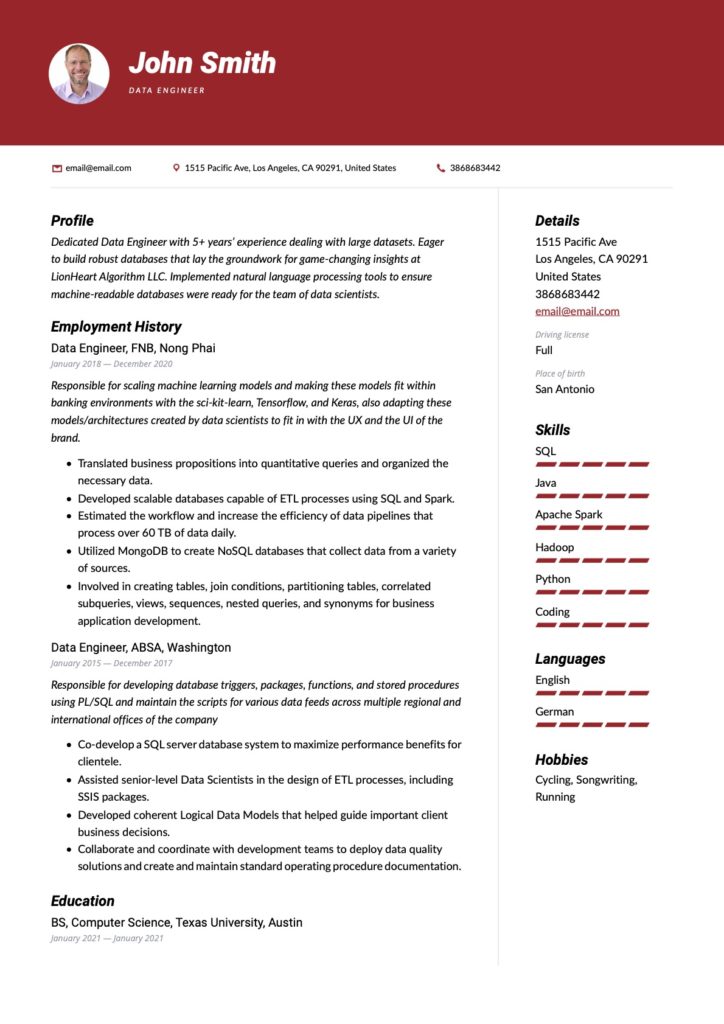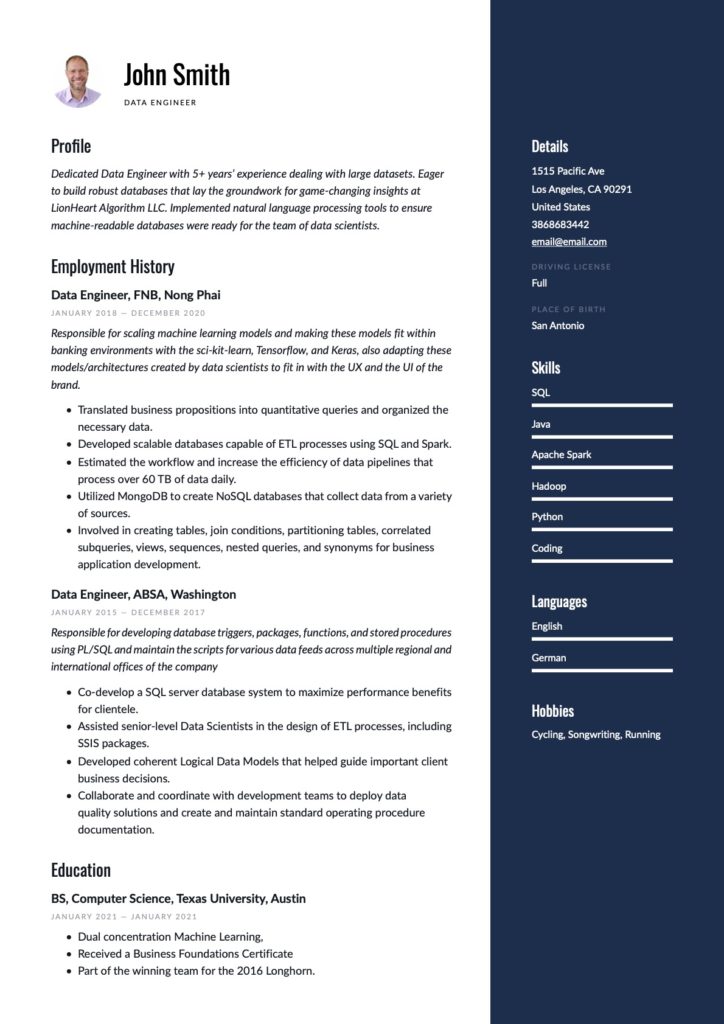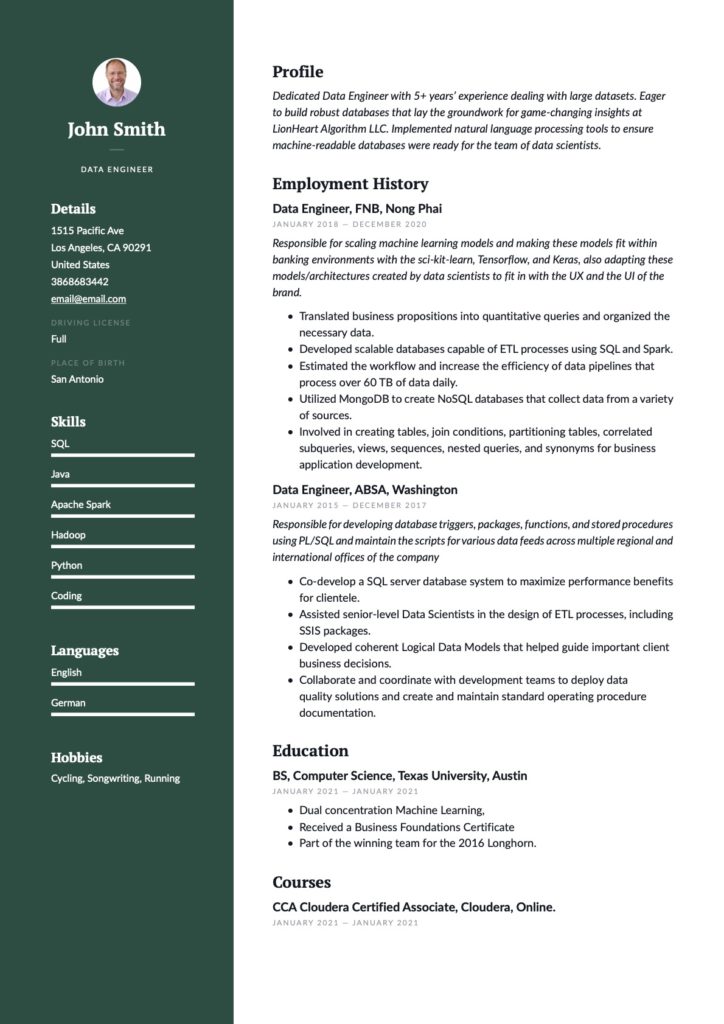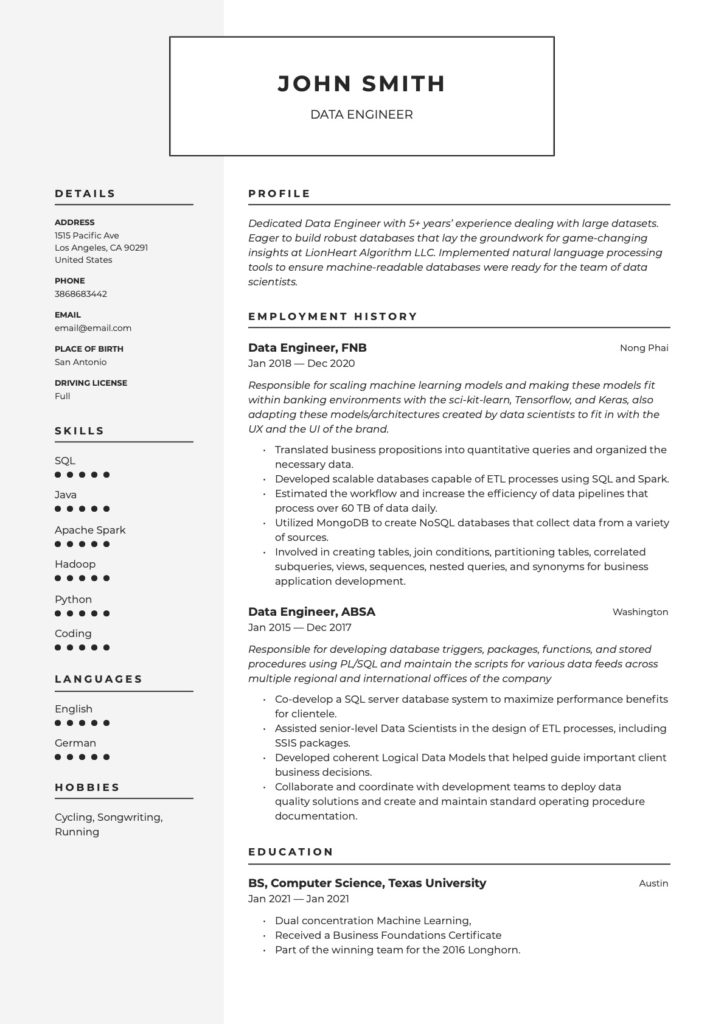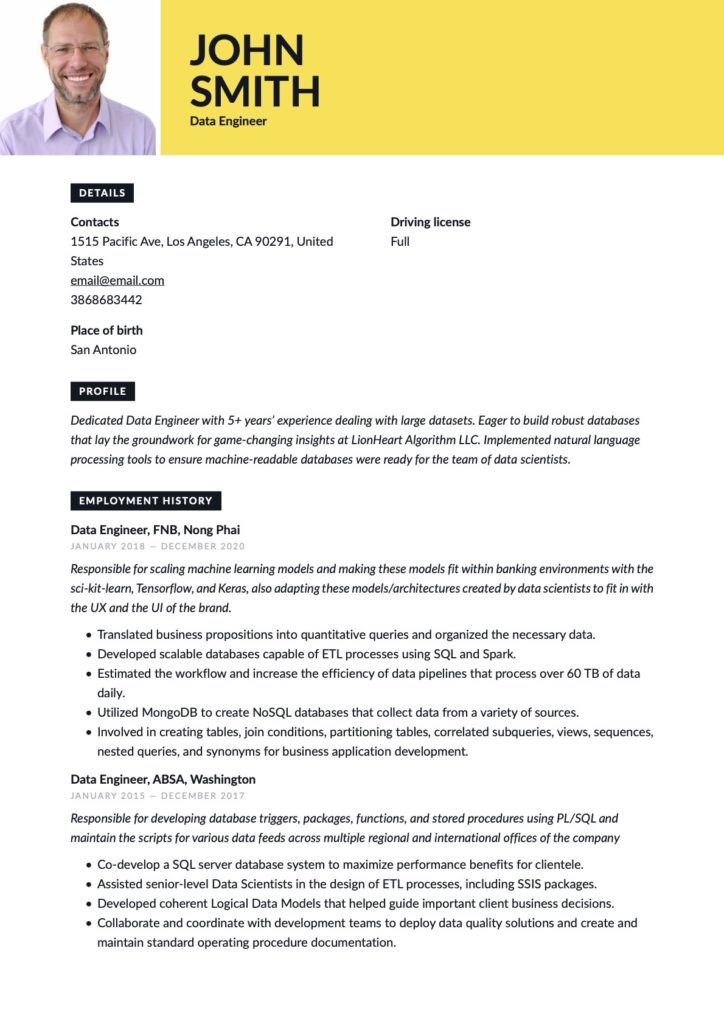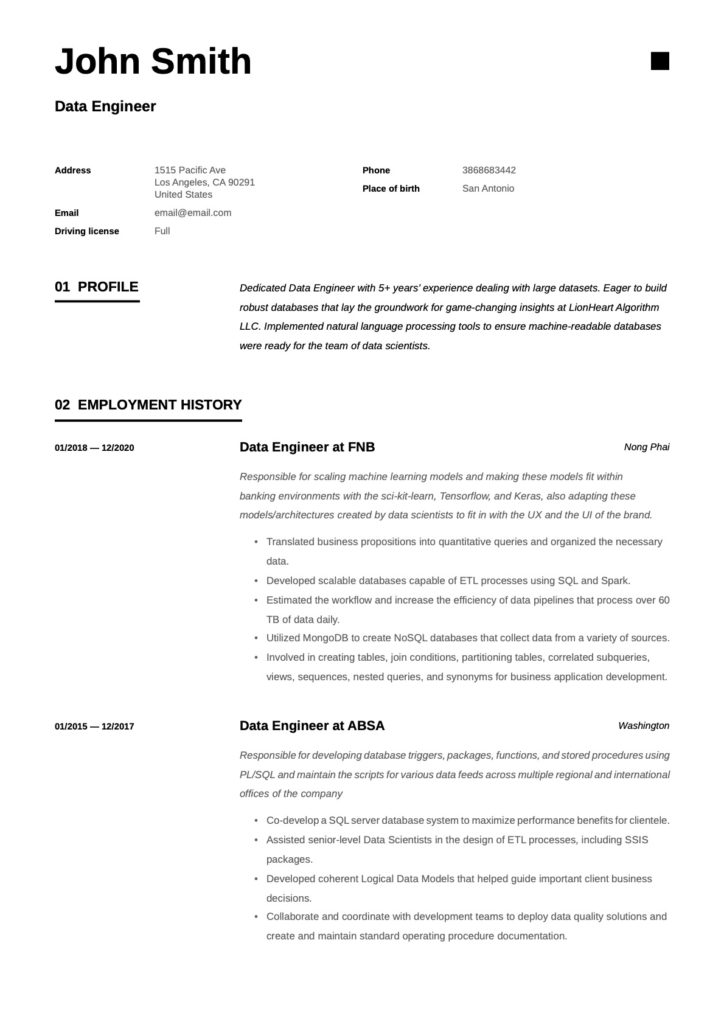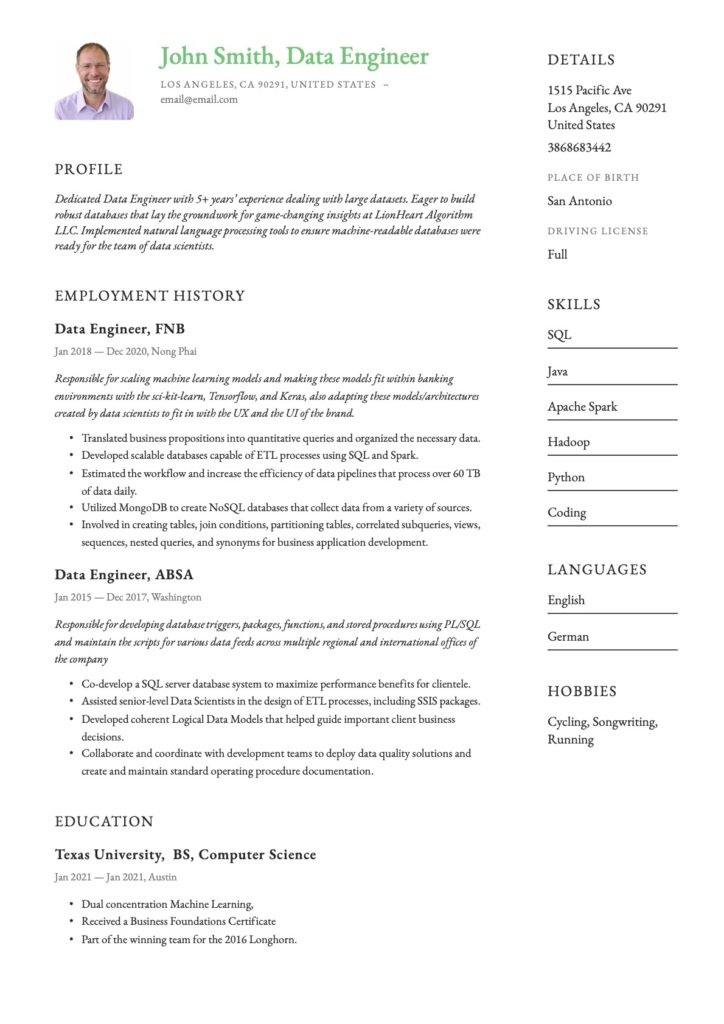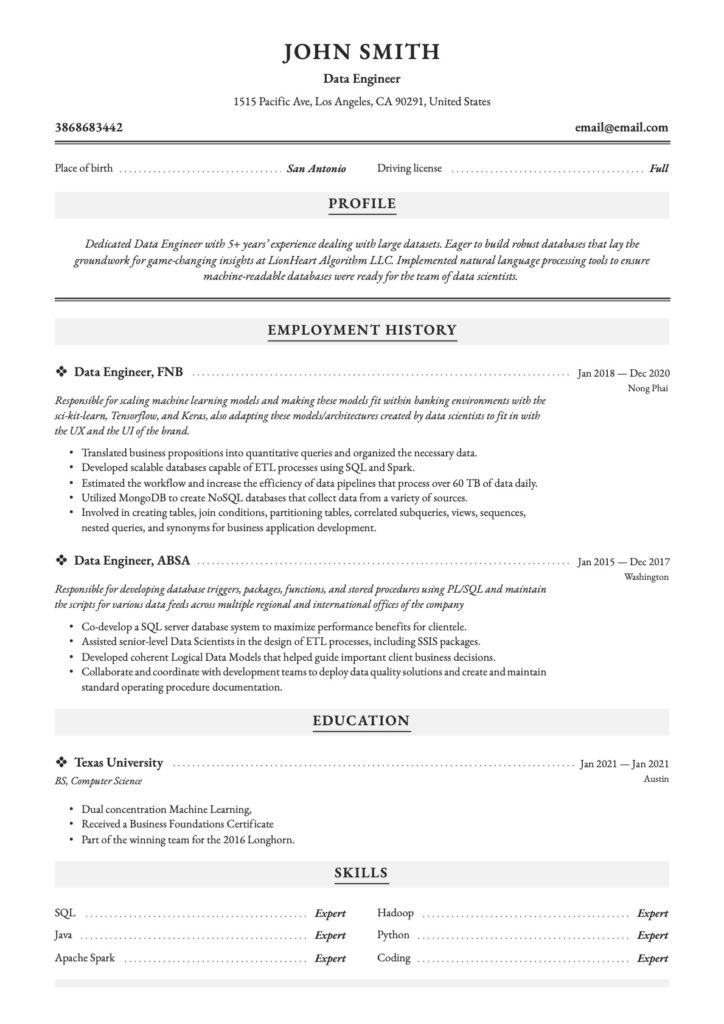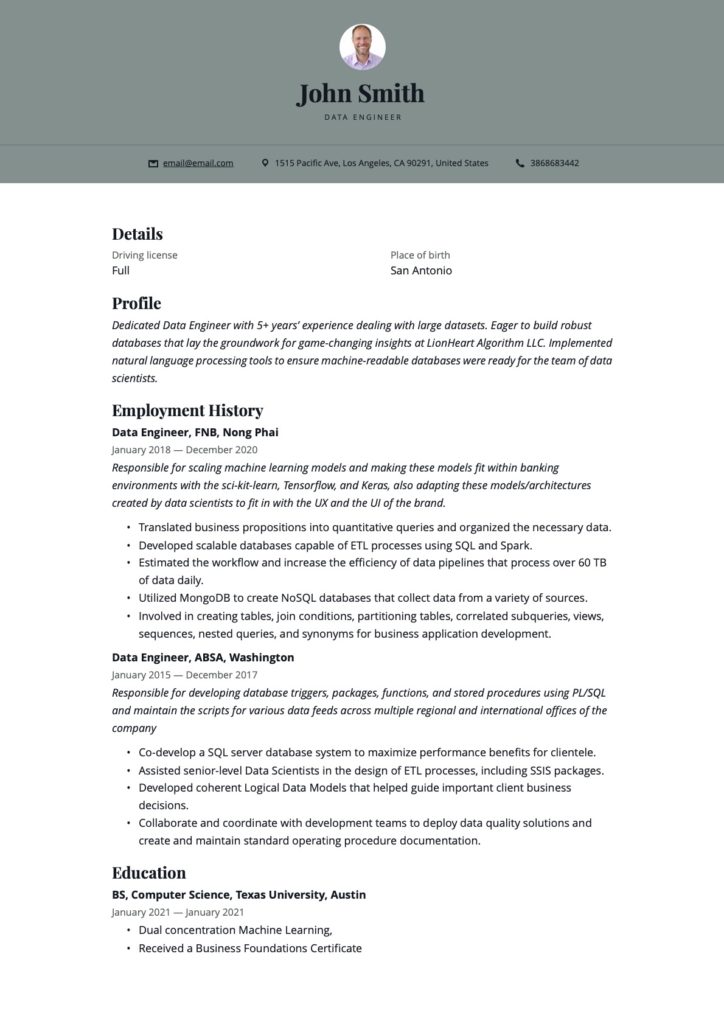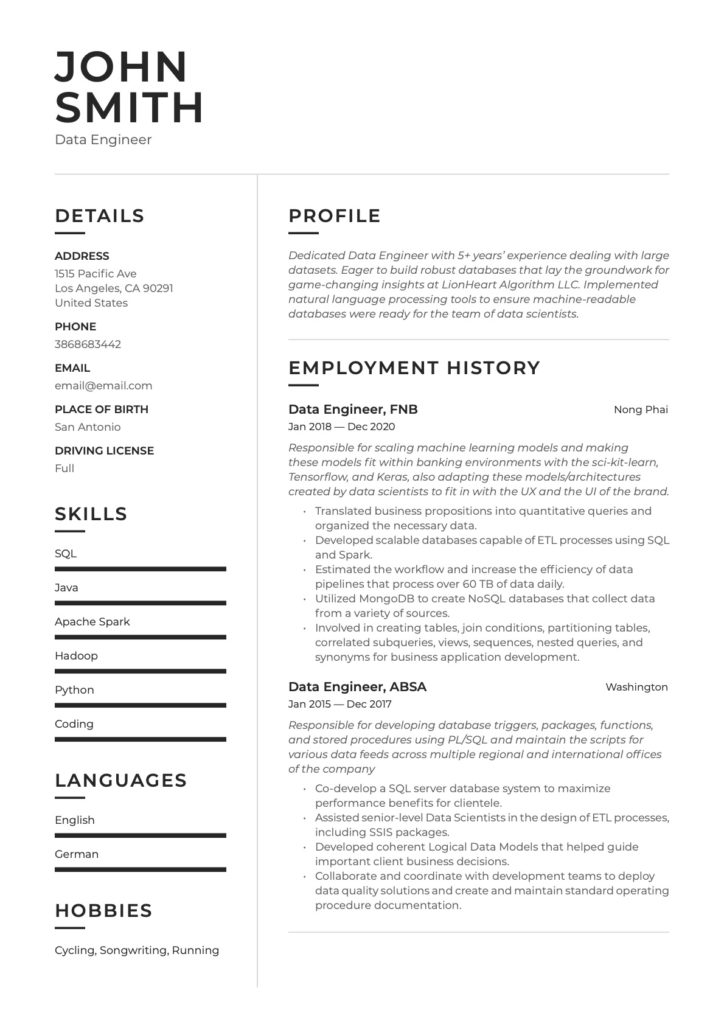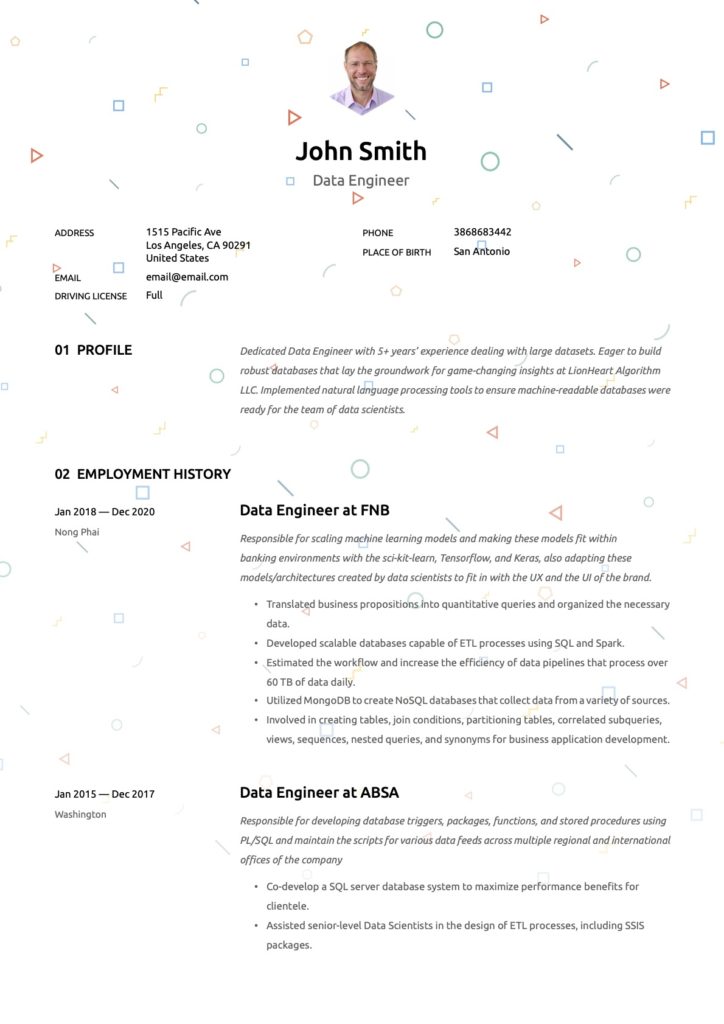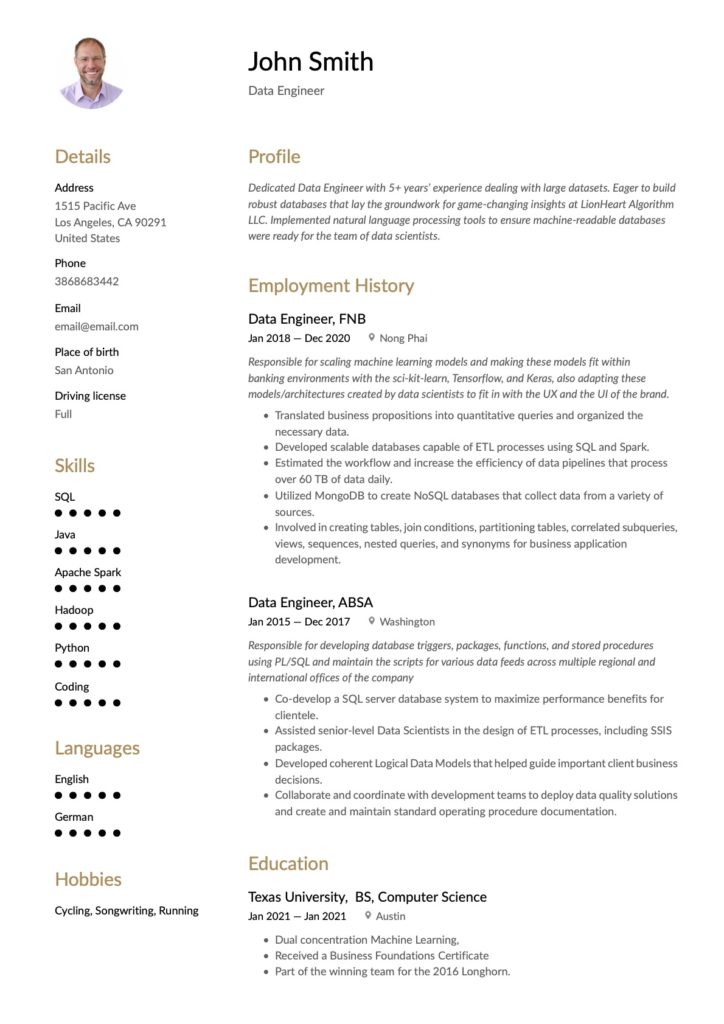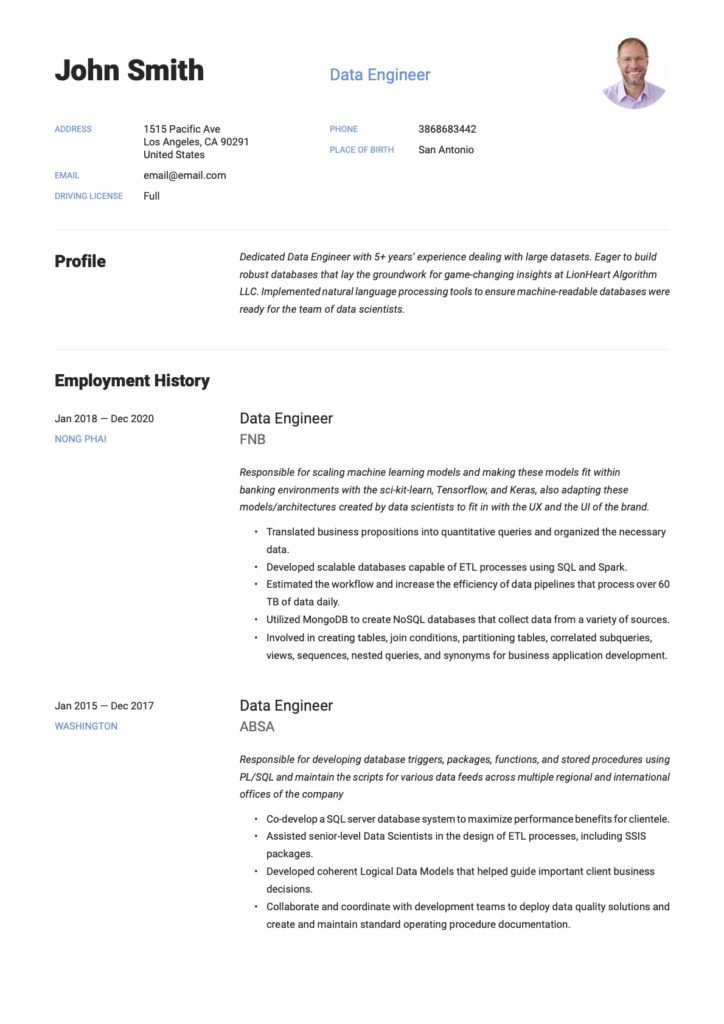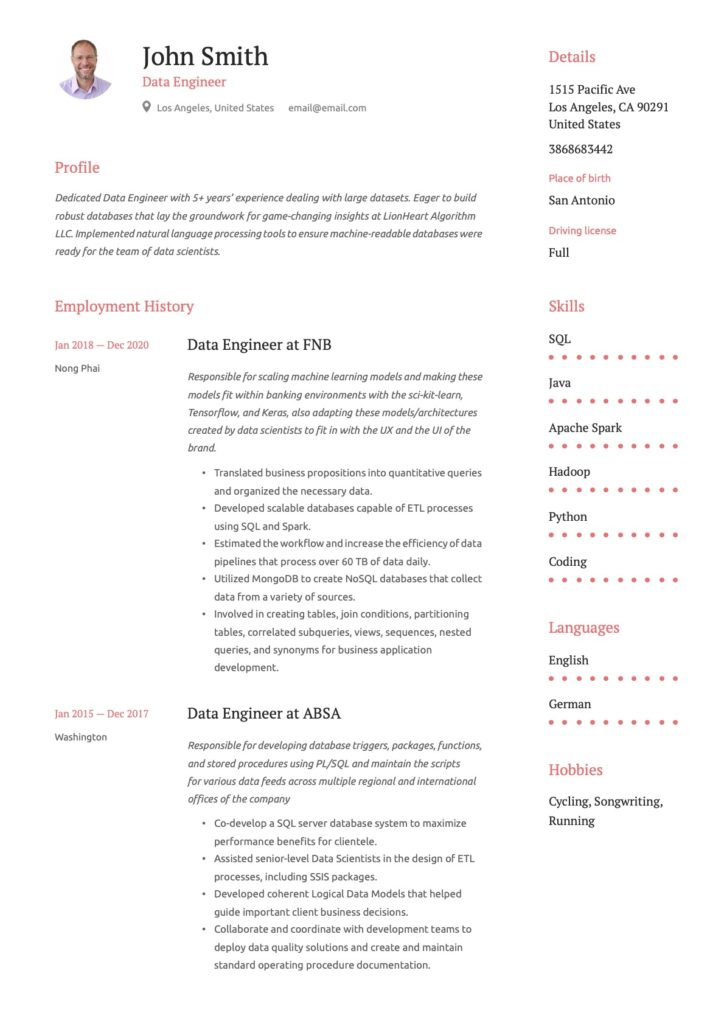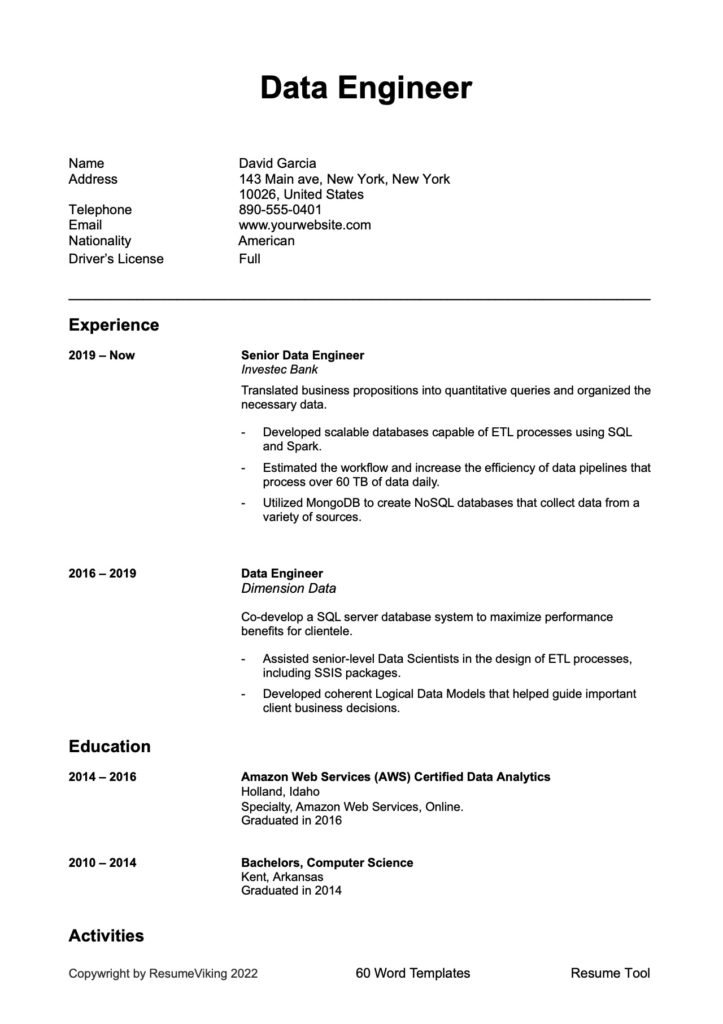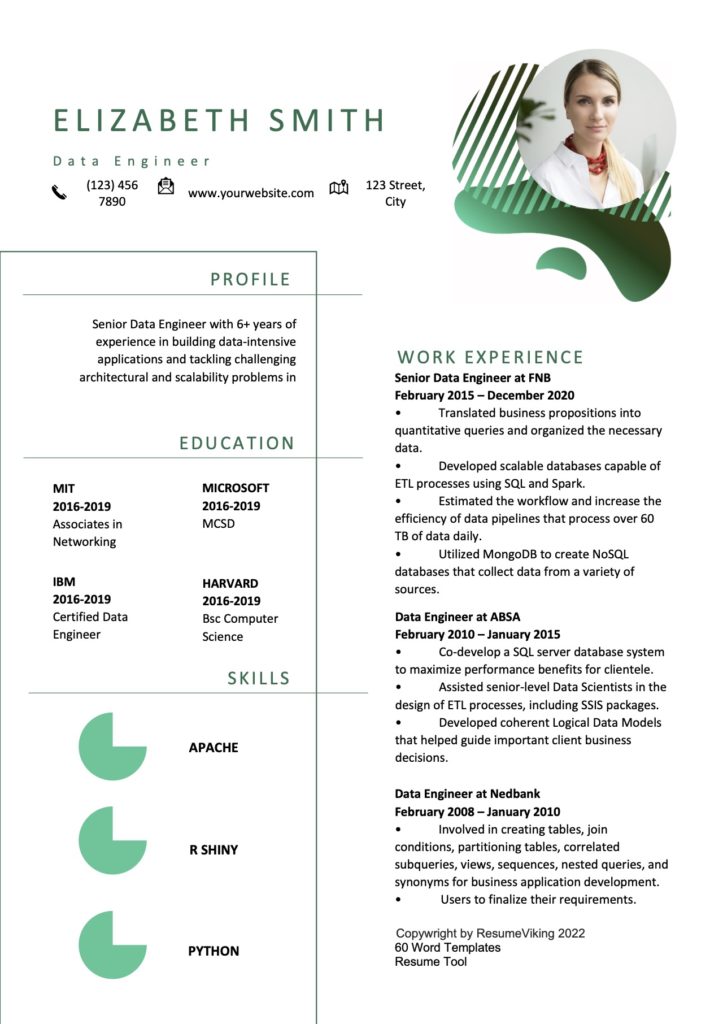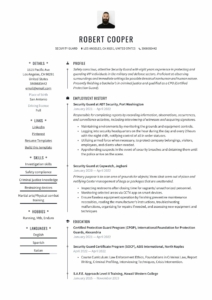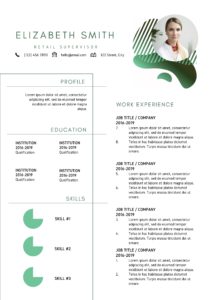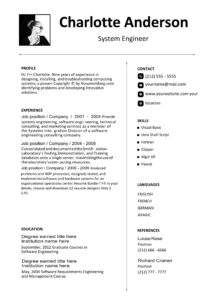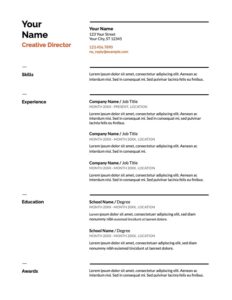Our Data Engineer Resume samples can help you create the perfect resume that will knock the socks off any recruiter or hiring manager. Your passion may be all about algorithms, data sets, and correlations, but ours is ensuring that you create an interview landing resume.
Creating your resume into an interview-winning document is not a daunting process. We will explain this to you in detail below.
What you can read in this article
Data Engineer Resume Example Downloads
Data Engineer Word Resume Downloads
Data Engineer Resume Writing Guide
What to Highlight as a Data Engineer
Large data jobs are becoming increasingly more specialized, which is resulting in employers searching for Data Engineers who are more specialized and have more to offer. This, however, means that your resume needs to be more specialized and must include the specific skills, experience, and qualities that hiring managers are looking for. You may be a highly skilled Data Engineer, but if you cannot convince others of this in your resume, your skills are effectively wasted. Below, we have listed several areas that you should highlight to maximize your chances of landing an interview.
Firstly, an impressive experience section in a Data Engineer resume will show employers that your data pipelines will not break at 3 AM. Further, it will show that you are going to make a positive impact in the workplace. Demonstrate that you can continuously improve technology stacks and architecture, and that your clean and testable code reduces technology debt.
Focus on the following:
- Displaying an impressive technical skill set.
- Discuss the challenges you have faced and how you managed to solve them.
- Show that you are a critical thinker.
- Make it known that you can easily learn a new technology stack.
- Your skills and certifications
- Because technology stacks vary from company to company, directors of Data Engineering that read your resume will look for the first three points.
Suppose you are an entry-level Data Engineer. In that case, it is advisable to show employers your past business experiences and specifically the duties and responsibilities you were given and how you impacted these roles.
Secondly, you need to clarify and elaborate on the types of roles you have been given at previous jobs and clarify what roles you wish to be placed in if you are employed. Below are a few examples:
- Generalist: Typically found in small teams or small companies. These Data Engineers wear multiple hats as one of the few “data-focused” employees in the company.
- Pipeline-centric: Mostly found in midsize companies working alongside Data Scientists. According to Dataquest, Pipeline-centric data engineers need “in-depth knowledge of distributed systems and computer science.”
- Database-centric: Found in larger organizations, data engineers focus on analytic databases, where managing the data flow is a full-time job.
Lastly, focus on the purpose of your role:
Analytical Skill:
- These engineers often have more analytical skillset and usually help people with computer science, mathematics, and physics training.
- These engineers are responsible for scaling machine learning models and making these models fit within production environments. They have relevant knowledge in data science and the know-how to code very well.
- These engineers know the sci-kit-learn, Tensorflow, and Keras. These professionals adapt the models/architectures created by data scientists, define the design patterns, and ensure models run in production for millions of users to use. This is currently the most difficult profile to find.
Builder Skill:
- These engineers are focused on the monitoring of resources, provisioning, pipelines, and volumetry. They know how to raise a cluster from scratch, understand APIs/libraries' solutions, and have an in-depth knowledge of them.
- Typically, these professionals will have training in information systems and project management.
Developer Skill (Code):
- These engineers are specialists in developing big data, batch, or real-time applications.
- Developers have a great knowledge of software architecture, standards, and programming languages. Usually, these professionals have moved from the software development area to the big data area with a computer science and information system background.
Career Summaries & Objectives
Although there may be certain sections within a Data Engineer resume that seem generic, do not simply copy and paste your information from one resume to the next. To capture the reader’s attention, you need to tailor your resume to reflect what the job description is looking for. When listing your experience, ensure that you quantify this information by showing how you made a difference. See the below examples for guidance.
Resume Hack: Integrate keywords from the job description into your career summary and throughout your resume. The Application Tracking System (ATS) Bot is programmed to look for specific terms during the automated screening process, and if you have these keywords, your resume will get noticed.
Examples
"Dedicated Data Engineer with 5+ years’ experience dealing with large datasets. Eager to build robust databases that lay the groundwork for game-changing insights at LionHeart Algorithm LLC. Implemented natural language processing tools to ensure machine-readable databases were ready for the team of data scientists."
"Highly qualified Data Engineer with proven distinction in application development and proving the single-handed support for Consumer Business project during production deployment. Competent in working with OLTP and OLAP databases in production and data warehousing applications."
"Senior Data Engineer with 6+ years of experience in building data-intensive applications and tackling challenging architectural and scalability problems in finance. Currently helping Axia with Petabyte scale data pipelines."
"Looking for a Senior Data Engineering position with leadership responsibilities that will utilize project management. Problem-solving skills gained from education and extensive work experience within the computer industry."
Employment History, Job Description & Responsibilities
Data Engineers are responsible for organizing the collection, processing, and storage of data. Through expert knowledge of databases and their structures, Data Engineers prepare data to develop effective data pipelines upon which business forecasts can be gathered. The purpose of a Date Engineers employment history is to show hiring managers that you have the skills and experiences to make a meaningful impact on their company.
Samples:
Senior Data Engineer at FNB
February 2015 – December 2022
- Translated business propositions into quantitative queries and organized the necessary data.
- Developed scalable databases capable of ETL processes using SQL and Spark.
- Estimated the workflow and increase the efficiency of data pipelines that process over 60 TB of data daily.
- Utilized MongoDB to create NoSQL databases that collect data from various sources.
Data Engineer at ABSA
February 2010 – January 2015
- Co-develop a SQL server database system to maximize performance benefits for clientele.
- Assisted senior-level Data Scientists in the design of ETL processes, including SSIS packages.
- Developed coherent Logical Data Models that helped guide important client business decisions.
Job Duties Samples
A Data Engineer at the entry-career stage (0-2 years experience):
- Involved in creating tables, join conditions, partitioning tables, correlated subqueries, views, sequences, nested queries, and synonyms for business application development.
- Centrally involved in writing SQL queries (Subqueries and Join conditions) and PL/SQL programming.
- Understands the existing business processes and interacts with Super Users and End Users to finalize their requirements.
- Design and develop logical and physical Data Models of Schema Wrote PL/SQL code for data conversion in their Clearance Strategy Project.
- Develop database triggers, packages, functions, and stored procedures using PL/SQL and maintain the scripts for various data feeds.
- Create indexes for faster retrieval of the customer information and enhance the database performance.
A Data Engineer at the mid-career stage (2-4 years experience):
- Work in a team environment to fix data quality issues by creating Regular Expression codes to parse the data.
- Review audit data ingested into the SIEM tool for accuracy and usability.
- Collaborate and coordinate with development teams to deploy data quality solutions and create and maintain standard operating procedure documentation.
- Create trouble tickets for data that could not be parsed.
- Fix ingestion issues using Regex and coordinated with System Administrators to verify audit log data.
- Apply processes improving and re-engineering methodologies to ensure data quality.
- Utilize the HP ARC Sight Logger to review and analyze collected data from various customers.
A Data Engineer at an experienced/advanced stage (4-6 years experience):
- Lead teams to create solar production forecasting engines at variable spatial and temporal resolutions for the nationwide fleet of over 250,000 homes.
- Produce hour and day-ahead forecasts based on local irradiance predictions.
- Deliver to internal and external customers via REST API and CSV downloads.
- Brainstorm new products, validate engineering designs, and estimate market acceptance with the back of the envelope calculations.
- Followed up with more detailed modeling leveraging internal customer data and relevant external sources.
- Collaborated with Django-based reporting teams to generate customizable executive reports.
Accomplishments
Data Engineers add value by providing expert insight into businesses, processes, operations, or trends in a way that is easy for internal and external stakeholders to understand. The information you include in this section needs to be informative, relevant, and accurate. You may be tempted to avoid on this section because you are struggling to formulate accomplishment statements. Below, we have provided a few examples to assist you:
- Give examples of how you were able to deliver data to a business client in the most efficient and compliant way possible
- Provide examples of how you verify your results—input vs. output in terms of aggregative amounts or a sample of rows.
- List an example of how you use data structures and how you grain/join/split data and create synthetic keys.
- Showcase competency with SQL, ODBC in MS Access, and ETL batch scripts.
- Discuss complex projects that highlight the above if you have no related work-related examples.
Below are examples of FLAT, BORING, and BLAND statements:
- Developed a data pipeline that led to a process optimization
- Solved an ETL issue by following PL/SQL best methodology practices
Now, these are more like it:
- Developed a data pipeline with Delta Lake that led to process optimization and a corresponding revenue increase of 21%.
- Successfully figured out ETL issue while following PL/SQL best practices that resulted in an insight that increased the client’s customer base by 37%.
Education Section
This section may not be the biggest section in your resume, but it is vitally important, and many employers spend a large amount of time looking over this specific section.
Within your education section specifics, you will want to highlight:
- Date of Graduation
- Graduate Degree
- Any Work-related Education Certificates
- Name of the School
- GPA
Every potential employer will look for different qualifications when reading an applicant’s resume. It would help if you planned for this by becoming familiar with the job description and including the most important qualifications to that employer. If you graduated within the last five years, ensure that your education section is either in line with or above your experience section. Include your graduation date or range of years you attended school, any honors you received, and your GPA if it was over 3.5.
If it has been longer than five years since you graduated, it is better to move your education section below your professional experience. You want the readers' focus to be on your experience. If you have several advanced degrees, such as master’s or doctoral degrees, rank them with the highest degrees first.
If you are yet to graduated yet, you should still include an education section. List the name of the institution, the degree type, and when you are expected to graduate.
Here is how to list education for a Data Engineer:
2020 – Amazon Web Services (AWS) Certified Data Analytics – Specialty, Amazon Web Services, Online.
2019 – CCA (Cloudera Certified Associate. Cloudera, Online.
2012–2016 BS, Computer Science, the Texas University at Austin. Dual concentration Machine Learning, Received a Business Foundations Certificate, and Part of the winning team for the 2016 Longhorn.
Data Engineer Resume Skills
Below is an example of how to put skills in a data engineer resume:
List the programming languages, database management technologies, and other technical skills you have had experience with. Do not forget to list soft skills. They are often what the hiring manager uses to decide whether you are a good fit for their company or not.
A Skills Matrix, such as the one below, is a smart approach to combine technical and interpersonal skills in an organized and attractive manner.
| Technical Competencies | Interpersonal Traits |
| Python | Teamwork |
| Hadoop | Communication |
| Java | Adaptability |
| Scala | Creativity |
| Hive | Problem-solving |
| Apache Airflow | Interpersonal Skills |
| Apache Spark | Work ethic |
| Apache Kafka | Time management |
Qualifications/Certifications associated with Data Engineers
| Google Cloud Certified Professional Data Engineer | Cloudera Certified Data Engineer | Certified Data Management Professional (CDMP) |
| IBM Certified Data Engineer — Big DataCloudera Certified Professional (CCP) Data Engineer | Vendor-Specific Certifications: Oracle, Microsoft, IBM, Cloudera, | Certified Data Management Professional (CDMP)Google Cloud Certified Professional Data Engineer |
Optional Extras for Data Engineer Resumes
Including language skills, hobbies, or a volunteer section will add some personality to your resume. This will show recruiters that you are the full package. You can also add more ‘’technical applications’’ that you have had experience with, such as:
- Programming in Java, C++, and Go and functional languages such as Scala, Clojure, and Elixir.
- SQL and NoSQL interfaces: KQL, Elasticsearch, and API.
- Webservices.
- ETL APIs/platforms: Spark, Airflow, Luigi, and Nifi.
- Management of VMs: EC2 and GCC.
- Container Orchestration: Kubernetes, AWS Faregate, and Mesos.
- Provisioning and Monitoring Tools: Terraform, New Relic, and ELK.
Professional information for Data Engineers
Sectors: Various
Career Type: Data Engineering, GIS, Data Science, Data Building, Data Analysis, Data Modeling, Data Architecture, Coding, Programming, Actuarial Science, Mathematics
Person type: Analyst, Developer, Programmer, Coder, Data miner, Collector, Actuary, Statistician, Mathematician
Education levels: Bachelor’s to Masters’ Degree
Salary indication: Average of $92 291 per annum (Payscale)
Labor market: 50% growth in the next five years (Quanthub)
Organizations: SME, Fortune 500, Government, NPO, Corporate, Commercial,
